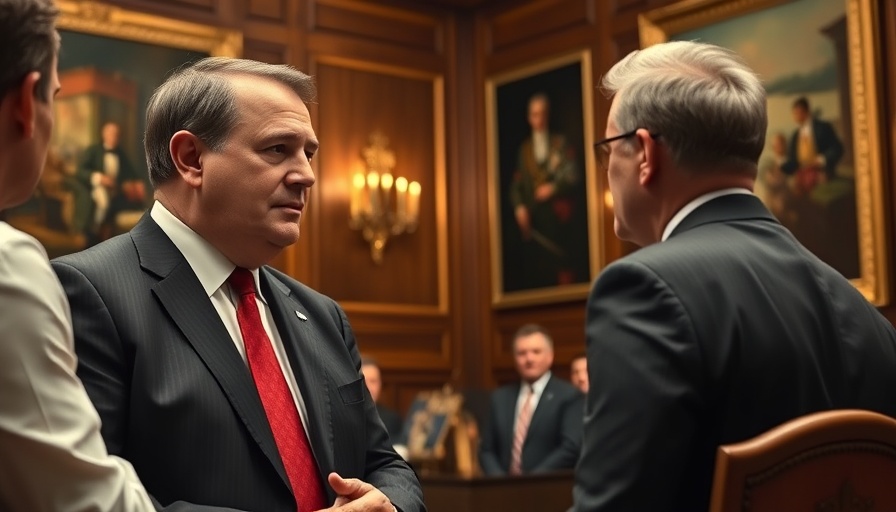
Trump's Controversial Push: The Stakes of Defunding Harvard
The ongoing clash over President Trump’s push to cut federal funding for Harvard University has been a topic of heated discussion, particularly concerning its impact on vital research aimed at addressing veteran suicide. As the administration aims to terminate contracts linked to the university, concerns regarding the repercussions on medical initiatives supporting veterans are coming to the forefront.
A Closer Look at the Research Impact
Key projects under the lens include collaboration initiatives with Harvard Medical School that focus on developing predictive models for emergency room physicians at the Department of Veterans Affairs (V.A.). These models are crucial for determining whether veterans exhibiting suicidal tendencies require hospitalization.
Seth J. Custer, a research official at V.A., has voiced serious concerns, indicating in a May 8 email that the cancellation of such research could lead to an increase in preventable veteran suicides. “Without these resources, we’re risking lives,” he warned. Yet, this sentiment clashes with opinions from figures like John Figueroa, a senior adviser within the V.A. He contends that similar research could be conducted elsewhere, thereby questioning the need for Harvard’s involvement specifically.
The Political Ramifications of Targeting Harvard
The tension surrounding this situation serves as a broader reflection of the Trump administration’s strategy in exerting pressure on higher education institutions. By leveraging research funding against universities, the administration risks alienating veteran communities—an essential voter base for Republicans. With veterans historically serving as a focal point for political campaigning, this clash raises eyebrows regarding potential fallout from severing ties with a leading research institution.
Peter Kasperowicz, a spokesperson for the V.A., has echoed that these contracts are under review, asserting that evaluations are aligned with a “veterans-first agenda.” However, the ambiguity regarding what that specifically entails raises concerns about prioritizing research based on political motivations rather than scientific need.
How Veterans Are Ultimately Affected
The consequences of defunding crucial research extend beyond political maneuvering; they directly impact the health and safety of veterans. The V.A. has pledged to cut contracts and reduce its workforce significantly, raising alarms about the capability of the department to adequately support veterans in need.
Advocates for veterans stress that cutting contracts can derail progress on suicide prevention, particularly given the alarming rates of veteran suicides—22 per day, as reported by the V.A. “Investments in research can lead to better treatment options,” emphasized Custer. The loss of funding for crucial studies compromises advancements already underway and ultimately undermines efforts to enhance veteran care.
Voices from the Community: Advocates Stand Firm
Veteran advocacy groups have rallied against these proposed funding cuts, emphasizing that research collaboration promotes innovative solutions to pressing issues faced by veterans. “The military community deserves the best possible care and support, and that requires continual investment in research,” argues Matt Miller, a veteran advocate.
Moreover, transitioning critical research to alternative institutions may not ensure the same caliber of results, given that established partnerships with leading experts possess a wealth of experience in the unique challenges veterans face.
Potential Solutions and Moving Forward
As advocates, policymakers, and the V.A. engage in discussions regarding defense budgeting and veteran care, the dialogue should chiefly focus on innovative funding mechanisms that revolve around necessity rather than political implications. Ensuring funding for critical research—especially in suicide prevention—should remain paramount, irrespective of the institutions involved.
The path ahead must embrace collaboration across multiple sectors, bringing together universities, government agencies, and non-profit organizations. Such partnerships can ensure comprehensive approaches to the complexities surrounding veteran health issues.
Join the Conversation: Advocate for Veterans' Research Funding
As this story unfolds, it is essential for community members and those affected to voice their concerns. Engage with local representatives, attend town halls, or write letters advocating for sustained funding for veteran-centric research initiatives. Together, we can make a difference in preserving the well-being of our veterans.
 Add Row
Add Row  Add
Add 




 Add Row
Add Row  Add
Add 

Write A Comment